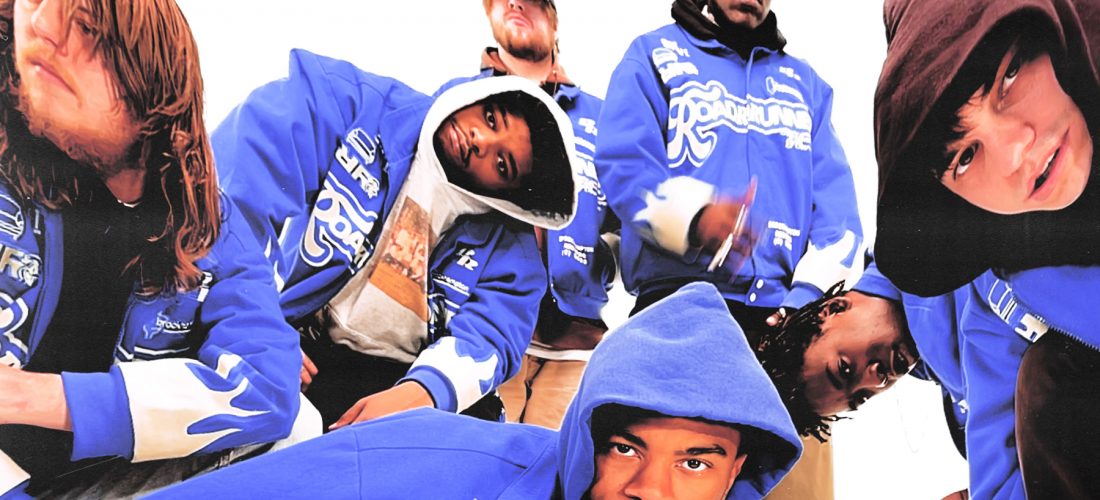Brockhampton Process Pain and Get Closer to Pop on ‘Roadrunner: New Light, New Machine’
Brockhampton albums can be a lot of work for a listener. The group’s 13 members include a handful of rappers trading bars that can be shadowy and introspective. Always at least 45 minutes long, their six albums are no small time commitment in the era of short songs, rap loosies, and EPs. They’re scattered in tone and style, jerking you from one genre to another, showing versatility but at times incohesion. Iridescence, their 2018 release, is particularly challenging, industrial and frenetic. They hoped to follow it with a “feel-good,” “summer” album, but instead, 2019’s Ginger was often vaguely downtrodden.
Their sixth album Roadrunner: New Light, New Machine manages to be the easy listen that Ginger was not, which is surprising since it was created amidst tragedy. Roadrunner is influenced by the suicide of groupmember Joba’s father. For years, the specter of suicide has lingered over Brockhampton’s music [see “Boys” from 2017’s Saturation]. Now, they’ve been forced to process it in reality. Joba’s loss has pushed him to meditate on passion and purpose, and while there are no holds barred when Joba confronts his pain, the album as a whole feels inspired, and even hopeful. Brockhampton has experimented with what it means to be an “American Boyband,” acknowledging that rap is pop’s present and future, while subverting the aesthetic expectations that comes with the “boyband” moniker with their candid confessions. Interestingly enough, even as founder Kevin Abstract admits he’s weary of the signifier, the group leans further into the accessibility of a boyband than ever before.
More than half of the album is made sunny with dusty bass, dancing keys, uplifting harmonies, or groovy bounce. Standout “I’ll Take You On,” is a pulsing romance assisted by R&B old-head Charlie Wilson. The dreamy “When I Ball” mediates gratefully on parents’ love and hopes for their children with raps that perfectly balance clarity and poetic abstraction. Still, sometimes the bright landscapes mask darker lyrical undertones. “Don’t Shoot Up the Party,” sounds like it was made for a Nineties dance floor, but is haunted by themes of internalized racism and paranoia. Even “The Light Pt. II,” in which Joba elaborates on his dad’s suicide, is handled delicately. His verse is striking and detailed, musing on his father’s final moments and lasting impact, but the song is sparse and airy, with sighing coos and casual guitar. It’s preceded by a short, stirring gospel prayer by singer Bearface.
Often, when Brockhampton isn’t dealing in sensitivity, they’re peddling aggression, but Roadrunner’s most pummeling tracks mellow their characteristic abrasiveness. Lead single and album opener “Buzzcut,” with wired Detroit rapper Danny Brown, features loops of muted sirens and in-your-face attitude but decrescendos into soft singing laced with calm saxophone. “Bankroll” creeps and bounds with quietly distorted drums as Brockhampton’s rappers puff their chests with A$AP Rocky and A$AP Ferg. “Make her run like a Boston bomb,” raps Merlyn Wood without a hint of remorse. In their latest, Brockhampton has become more affable without sacrificing their edge.
In the group’s hopes for themselves, there’s an admitted tension. Some members, like producer Romil Hemnani, lust after hits. “I want to go to the club and see everyone dancing to our song. I want to get into an Uber and hear it on the radio,” he told the Guardian. “But I don’t want it to come at the expense of the soul of what we make.” Rappers Dom McLennon and Kevin Abstract say they’re only interested in maintaining emotional authenticity and connection. Of course, some of the best music can be raw while remaining widely accessible. Roadrunner: New Light, New Machine is Brockhampton’s best effort to balance these approaches; their hard times and brash raps go down more smoothly than ever.
